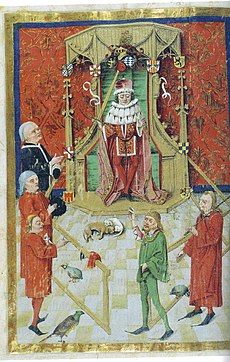Vassal
A vassal (from Celtic gwas, from Latin vassus "servant") in the Frankish Empire (5th-9th century) was a suitor who stood in a personal loyalty relationship (vassal loyalty) to a powerful lord as patron. Due to the personal legal relationship entered into, mutual duties of protection and obedience arose for the participants.
The vassal was a servant of his lord, into whose dependence he placed himself through the ritual act of commendation. The vassal was obliged to serve his lord in every way (auxilium et consilium). This included, in particular, war and council services such as participation in councils of vassals chaired by the feudal lord, but also the payment of ransom if the feudal lord fell into captivity. The lord had to provide the vassal with subsistence such as food, clothing and armament. In addition, the feudal lord represented the vassal in court, and the vassal in turn was an assessor in the feudal lord's court.
From the Carolingian period in the 8th/9th century onwards, the vassal received a fief to secure his maintenance and became a feudal lord through investiture under feudal law. The fruits of the feud and any rights were due to the vassal.
The feudal lord had rights that were otherwise only granted to the vassal's blood relatives. Thus, in the event of the vassal's death, he exercised the right of guardianship over the vassal's sons and the right of marriage over the vassal's daughters, and owed the vassal - as the vassal owed him - assistance in the event of a blood feud, as was owed only by blood relatives under the old tribal laws.
The vassalage was a personal bond that ended with the death of one of the two partners and had to be renewed with a possible successor. Only in the course of time did it become customary to continue the feudal bond with the respective legal successor on the basis of a right of succession, i.e. the feud became hereditary. The renewal of the feud after the death of the lord of the feud (Herrenfall, in the case of kings Thronfall) or of the vassal (Mann- or Lehnfall) and the issuing of a new Lehnbrief by the Lehnkanzlei was subject to a fee (Lehntaxe or Schreibeschilling).
A distinction was made between main vassals (vassals in the narrower sense), who received their fief directly from such a feudal lord, who had no other lord over him, and the so-called after vassals (Arriervasallen, Afterlehnsmann), who had received their fief themselves only from a vassal, for example a prince, through a subinfeudatio. An example of this is the relationship of the English to the French king in the 12th century. The English king had numerous possessions in France, but these were all feuds of the French king. The King of England was therefore subject to the King of France as his liege. As Duke of Normandy and Guyenne, and Count of Anjou, Maine, Berry, Brittany, Touraine and Poitou, he was the most powerful vassal in France, but a vassal all the same, so he was obliged to serve Philip II, although they were hierarchically equal.
In the late Middle Ages, sovereigns could only maintain their armies by granting their own lands as fiefs. Since they had to deprive themselves more and more of their own domestic power in this way, but in return made their feudatories more and more powerful, the oath of allegiance soon became a farce, since the feudatories eventually had to pay their feudatories extra to obtain their services.

A vassal swears the oath of fealty before the enthroned Count Palatine Frederick I of the Palatinate.
Questions and Answers
Q: What is a vassal in medieval Europe?
A: A vassal during the feudalism of medieval Europe was someone who had shared duties with a lord.
Q: What were the shared duties of a vassal and a lord?
A: Usually, the vassal provided soldiers to the lord, and the lord used his army of soldiers from all of his vassals to protect those vassals.
Q: What did a vassal get from a lord?
A: The lord gave him the piece of land that he held as a fief.
Q: What is the analogy of the term vassal used for?
A: By analogy, the term vassal is used also for similar systems in other feudal societies.
Q: What does a vassal do for a lord in Medieval Europe?
A: A vassal in Medieval Europe provided soldiers to a lord.
Q: How did the lord protect the vassals in Medieval Europe?
A: The lord used his army of soldiers from all of his vassals to protect those vassals in Medieval Europe.
Q: What did a lord give to a vassal in Medieval Europe?
A: The lord gave a piece of land that he held as a fief to a vassal in Medieval Europe.
Search within the encyclopedia